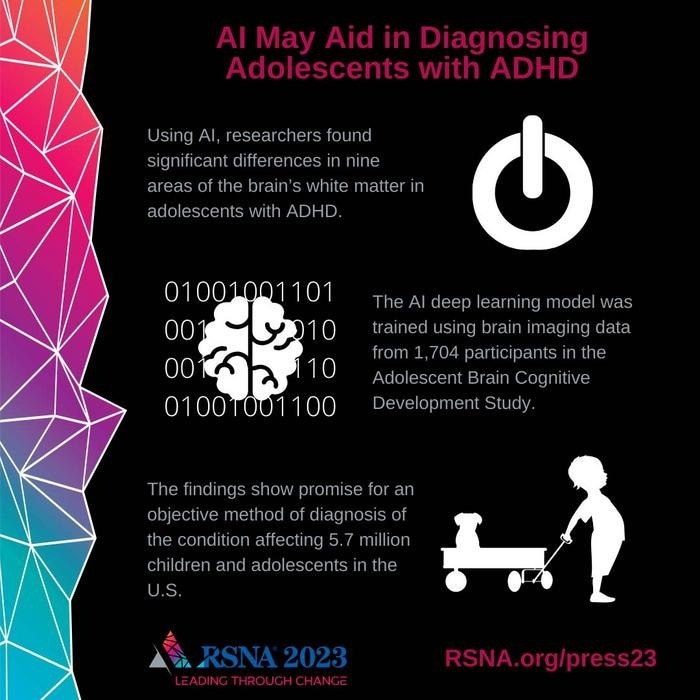
Using artificial intelligence (AI) to analyze specialized brain MRI scans of adolescents with and without attention-deficit/hyperactivity disorder (ADHD), researchers found significant differences in nine brain white matter tracts in individuals with ADHD. Image Credit: RSNA
According to the Centers for Disease Control and Prevention, ADHD is a prevalent disease that is frequently diagnosed in childhood and persists into adulthood. An estimated 5.7 million kids and teenagers in the US, ranging in age from 6 to 17, have an ADHD diagnosis.
ADHD often manifests at an early age and can have a massive impact on someone’s quality of life and ability to function in society. It is also becoming increasingly prevalent in society among today’s youth, with the influx of smartphones and other distracting devices readily accessible.
Justin Huynh, MS, Study Co-Author and Research Specialist, Department of Neuroradiology, University of California, San Francisco
Children with ADHD may struggle to pay attention, manage impulsive actions, or regulate activities. Early detection and action are critical for managing the disease.
Huynh added, “ADHD is extremely difficult to diagnose and relies on subjective self-reported surveys. There is definitely an unmet need for more objective metrics for diagnosis. That is the gap we are trying to fill.”
According to Huynh, this is the first study to use deep learning, a type of artificial intelligence, to identify ADHD markers in the multi-institutional Adolescent Brain Cognitive Development (ABCD) Study, which includes brain imaging, clinical surveys, and other data on over 11,000 adolescents from 21 research sites across the United States. The brain imaging data included diffusion-weighted imaging (DWI), a type of MRI.
“Prior research studies using AI to detect ADHD have not been successful due to a small sample size and the complexity of the disorder,” Huynh added.
The researchers chose 1,704 people from the ABCD dataset, including teenagers with and without ADHD. The researchers used DWI scans to derive fractional anisotropy (FA) measurements from 30 main white matter tracts in the brain. FA measures how water molecules flow along white matter tract fibers.
A deep-learning artificial intelligence model was trained using the FA values of 1,371 people. The model was then evaluated on 333 patients, 193 of whom had been diagnosed with ADHD and 140 of whom had not. The Brief Problem Monitor evaluation, a rating instrument for tracking a child's functioning and reaction to interventions, was used to diagnose ADHD.
The researchers found that FA values were considerably higher in nine white matter tracts in patients with ADHD, using artificial intelligence.
Huynh further stated, “These differences in MRI signatures in individuals with ADHD have never been seen before at this level of detail. In general, the abnormalities seen in the nine white matter tracts coincide with the symptoms of ADHD.”
The researchers plan to keep collecting information from the remaining participants in the ABCD dataset to compare the effectiveness of other AI models.
“Many people feel that they have ADHD, but it is undiagnosed due to the subjective nature of the available diagnostic tests. This method provides a promising step towards finding imaging biomarkers that can be used to diagnose ADHD in a quantitative, objective diagnostic framework,” Huynh concluded.
Pierre F. Nedelec, MS, M.T.M., Samuel Lashof-Regas, Michael Romano, MD, Ph.D., Leo P. Sugrue, MD, Ph.D., and Andreas M. Rauschecker, MD, Ph.D. are the other co-authors.